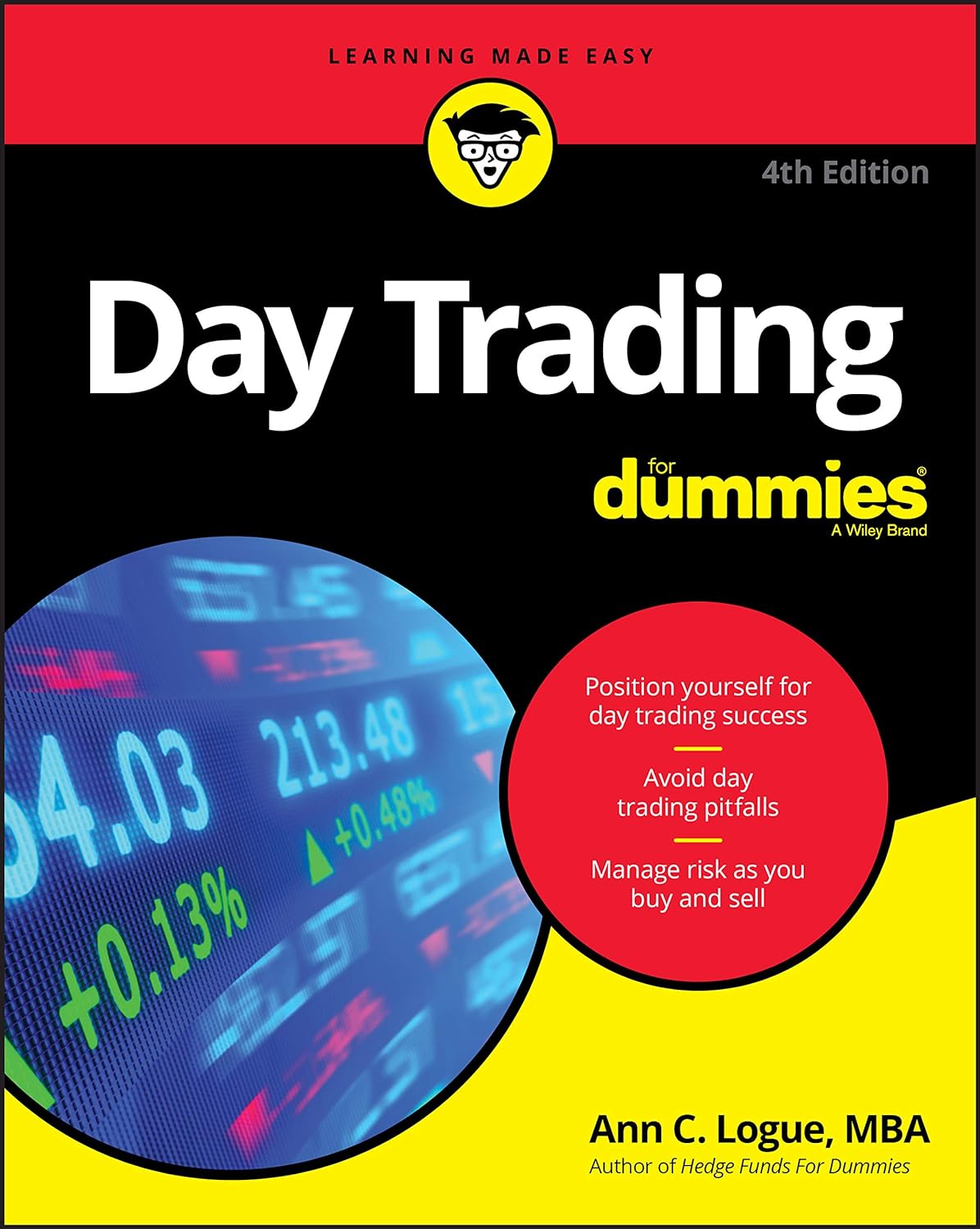Estimated reading time: 19 minutes
Introduction
Day trading attracts individuals keen on capitalizing on the stock market’s short-term fluctuations. Unlike traditional investors, a day trader operates within a single trading day, aiming to profit from minor price movements. The foundation of start day trading is its fast pace and the thorough analysis required to make quick, informed decisions. Success hinges on a solid understanding of momentum trading, range trading, and chart patterns—key components for navigating the market’s ups and downs.
Yet, many day traders lose money, a stark reminder of the risks involved. Jumping into the market without a strategic plan or deep knowledge of popular day trading strategies often leads to financial setbacks. For those committed to this path, it’s crucial to learn about trading volume, trading hours, and high-frequency trading. Brokers for day trading are crucial allies, providing platforms and resources designed for the unique needs of day traders. Mastering these areas is key to developing a day trading approach that reduces risk and enhances profit potential. Achieving success in day trading stocks goes beyond sharp market instincts; it requires discipline, comprehensive market understanding, and a commitment to ongoing learning and adjustment.
Key Takeaways
- Success in day trading hinges on a solid grasp of momentum trading, range trading, and chart patterns to adeptly navigate market fluctuations.
- Many day traders lose money, underscoring the critical need for a strategic approach and deep understanding of popular day trading strategies.
- Brokers for day trading play a crucial role, offering specialized platforms and resources designed for the unique demands of day trading.
- Employing technical analysis is vital for day traders, facilitating informed decision-making through the study of market trends and historical data.
- To sidestep prevalent errors, day traders must recognize the risks involved, especially the potential pitfalls of margin trading and the advantage of using multiple platforms.
- Achieving proficiency in day trading demands ongoing education, adaptation to market evolutions, and the strategic application of technical analysis and risk management practices.
Understanding the Basics of Day Trading
Grasping the essentials of day trading highlights the swift and demanding nature of the fast-paced world of day trading. A pattern day trader must execute four or more day trades within a five-day span, underlining the active involvement needed. Day traders often rely on a well-thought-out trading plan, using common day trading strategies for market navigation. Key resources day traders use include real-time analytics, crucial for making informed decisions within the same trading day. Success requires day traders need to adeptly handle day trading is buying and selling actions swiftly to leverage short-term market fluctuations. Trading with real stakes increases the need for acute understanding, as day trading requires a significant commitment and effective risk management to achieve profitability of day trading. Regulatory compliance is also vital, as pattern day traders must adhere to specific financial regulations, highlighting the professional approach required in this field.

Getting Started with Day Trading: A Quick Guide for Beginner Day Traders
If you plan to dip your toes in the stock market, day trading might be a compelling venture. As beginner day traders, it’s essential to understand what day trading involves and its potential to turn profitable. It’s not like investing, where you hold stocks for a long term, day trading involves buying and selling stocks within a single day. However, you need to grasp the fundamentals of this business to make it worthwhile.
Starting in day trading demands a guide or a roadmap—knowing what to invest in, the right time to make a trade, and having a solid investment strategy. It’s all about making money, yes, but without the right preparation, you could lose the same amount you are trying to earn, or even more. You’ll need to have an account specifically designed for day trading. These accounts often offer tools to help traders like you to make informed decisions when trading.
Investing your time in researching the current market trends is crucial. The stock market fluctuates with time, and a successful investor knows when to make a move. Always keep abreast with latest market trends and news that could potentially affect your stocks.
To become profitable, you must master the art of swing trading— where traders hold stocks for a day or so, capitalizing on the stock’s price changes. Remember, in business, timing is everything and with swing trading, you might just hit the jackpot in terms of profits. Nonetheless, do not misconstrue this as a get-rich-quick scheme. It requires dedication and consistency.
Your investment strategy should be up to par too. Which stocks are you investing in? Do you have specific stocks you’re keeping an eye on? Are you considering investing in multiple businesses for diversification? These are some of the questions you need to address when setting up your strategy. Day trading can be a profitable venture but it’s not for the faint-hearted. It’s a game of risk and return, and only those who are ready to take the plunge get the rewards.
An In-depth Look at Technical Analysis for Day Trading
Technical analysis is pivotal in day trading, guiding the strategy of intelligent investors as they navigate the stock market. It’s an in-depth examination of securities, evaluating their potential to be profitable by looking at historical patterns and market trends. It’s a crucial aspect of planning your trades and making the right decisions that could significantly augment returns on your investment.
Here’s the thing about day trading: the stock market is unpredictable and volatile and requires considerable financial investment and a significant investment of your time. The proper ratio of time, financial resources, and knowledge about the ebb and flow of securities is crucial to your trading strategy’s success.
Technical analysis isn’t a one-size-fits-all solution. It requires tailored strategies adapted to meet the fast-paced day trading requirements. You must decipher complex market patterns, stay focused, and swiftly make informed decisions. Proficiency advisory services can help you make the most of your trades.
As a day trader, it’s imperative not to view the stock market as a get-rich-quick scheme but as a business opportunity. Careful planning, critical thinking, and a good understanding of technical analysis can make it a profitable business. It’s essential to continually review and update your trading strategies in line with market dynamics to reap beneficial financial rewards.
Despite sounding complex, all it takes is learning the basics of day trading and persistently practicing them. Technical analysis can significantly empower you in this business, and the effective use of it can lead to impressive profits. So, invest your time and funds wisely, seek experienced advisors for their invaluable advice, and you’re on your path to becoming a successful day trader.
While there is an inherent risk involved in trading stocks, implementing stringent risk management strategies and using technical analysis can significantly mitigate these risks, paving the path for a successful and profitable trading business.
Day Trading Techniques: The Tools and Skills You Need To Be A Successful Day Trader
In the competitive realm of day trading, a day trader may quickly realize that success in day trading requires more than intuition—it demands a strategic approach where trading is a strategy. Day traders typically use a combination of technical analysis tools and fundamental insights to spot trading patterns and capitalize on short-term market movements. Day trading is a fast-paced environment, compelling day traders to buy and sell frequently within five business days, often engaging in day trading on margin and spread trading to enhance potential gains. However, navigating the risks of day trading is crucial, as the profitability of day trading depends on effective risk management. Professional day traders also highlight the importance of continuous education and adaptability, given that market conditions can shift dramatically a lot during the day and the first months of trading may present steep learning curves. Hence, day trading work is not merely about swift decisions but informed ones, underscoring that achieving day trading is possible with diligent preparation and the right mindset.

Avoiding Common Day Trading Mistakes: From Margin Calls to Poor Decisions
Day trading is an exhilarating, highly engaging form of investing. However, if not properly navigated, it’s fraught with risks and pitfalls that can lead to poor decisions and, ultimately, margin calls. These mistakes can quickly turn an otherwise profitable venture into a money sinkhole. To avoid these ordinary day trading pitfalls, it’s crucial to have a comprehensive understanding of the technical aspects and the inherent risks of the market.
One of the most common and detrimental mistakes day traders make is trades with borrowed money, also known as margin trading. Trading on margin means you’re effectively taking out loans from your broker, lending you funds to invest in the stock market. This trading technique amplifies your profit potential, yet it also amplifies your potential for loss. Margin calls occur when the equity in your trading account drops below a certain threshold, forcing you to deposit more cash or sell off your stocks to pay back your loans. This can lead to hasty, poor decisions as you scramble to cover your debt.
Another risky behavior is putting too much faith in a single trading platform. Diversifying your platforms is smart- more information sources lead to a more balanced perspective. Relying solely on one platform can cloud your judgment, potentially leading to regrettable investment decisions. Consequently, it’s crucial to carefully choose the best platforms that align with your trading style and strategy.
Investing without a clear plan is a mistake many new-day traders make. It’s essential to remember that day trading is not a get-rich-quick scheme but a business requiring a calculated strategy, discipline, and patience. Explicit risk management rules, a trading routine, and profit-loss thresholds are essential.
In conclusion, day trading brings potential rewards and requires training, dedication, and risk awareness. By understanding and avoiding these common mistakes, you place yourself on the path to making the right trade.
Mastering The Art of Day Trading: Strategies to Boost Your Trading Performance
Achieving skill in day trading is a form that experienced day enthusiasts understand requires detailed planning and a solid grasp of market movements. Day traders buy and sell swiftly, often completing day trades within five business days to leverage short-term trading patterns and trends. An adept day trader may find that successful day trading requires a combination of disciplined study, ongoing education, and the capacity to make informed trading decisions. Acknowledging day trading is difficult is the first step; yet, with commitment, day traders consistently make profits by following clear trading strategies for beginners. Pattern day traders must maintain vigilance over average daily trading volume and stay prepared for shifts prompted by involves trading on news releases, carefully managing trading with real capital. Scalping is a trading method used to snatch quick profits before the end of the trading day, highlighting day trading is a short-term endeavor filled with challenges. Hence, choosing the best online brokers for day trading that provide essential tools and support is key for navigating market intricacies and improving trading outcomes.
Kick-Start Your Day Trading Career with a Solid Margin Account
Ready to kick-start your day trading career? It begins with establishing a solid margin account. A margin account can be your primary tool when managing your investments, but knowing how to use it properly is essential to your long-term profitability and performance in the financial market. Thus, as a trading beginner or even a seasoned trader, understanding the basics of margin trading is integral.
First off, let’s break down what a margin account is. Simply put, it’s a trading account that allows you to borrow money to invest in stocks. This strengthens your buying power and allows you to ramp up your investment beyond what your existing capital can allow – that’s the power of margin. However, similar to other financial tools, it comes with risks. For instance, margin amplifies not only your profits but also your losses, which can lead to margin calls or financial demands made by your broker if the value of your account falls below a certain level.
How can you use this account to kick-start your day trading career? The key lies in controlling the risks associated with margin trading. You can do this by ensuring a well-thought-out investment strategy, a good understanding of the stocks you’re investing in, and a clear awareness of market trends.
Another critical aspect is having a reliable financial advisor or guide to help you navigate the complexities of the financial market. Whether determining the correct trades to make or knowing when to pull out, a trustworthy advisor can provide the insights you need to make profitable decisions. In addition, using day trading techniques is also a great way to improve your performance and avoid common day trading mistakes.
With the right tools and strategic approach, a solid margin account can provide the initial boost you need in your day trading career. So, invest your time in mastering the art of day trading, and you’ll be well on your way to success!
Spotting Trading Opportunities: The Role of Detailed Analysis in Day Trading
Day trading involves buying and selling securities within the same day, and spotting trading opportunities plays a pivotal role in this process. It requires a meticulous view of the market and a detailed analysis of various stocks and other trades. As an investor involved in day trading, one must constantly keep their finger on the pulse of the market’s movements. This way, they can jump on lucrative opportunities that yield profitable returns.
Let’s delve into the role of detailed analysis in day trading. Understanding the intricacies of investing, the investor studies various market trends. Leveraging this information, they can make well-informed trading decisions and increase the likelihood of generating money. However, this isn’t as straightforward as it seems and necessitates careful planning and constant attention to market fluctuations.
Contrary to passive investors, a day trader doesn’t hold their stocks for a long time but trades them in a short span – sometimes even in minutes or hours. Hence, they require real-time market data and fast execution of trades. They use various day trading techniques to identify the potential selling and buying points. This includes using technical analysis tools, which help forecast a stock’s future price movements based on historical market data and trends.
However, successful day trading is not just about trading techniques and spotting opportunities. Avoiding ordinary day trading mistakes is equally important. This ranges from over-leverage, resulting in margin calls, to poor decisions made in haste. A good investor should seek the services of a seasoned advisor or use resources provided by their brokerage to mitigate such common issues.
Even with all this planning and strategizing, mastering the art of day trading is not a guaranteed path to instant wealth. It requires time, patience, and the ability to learn from mistakes. Doing so can improve their trading performance over time and possibly convert day trading into a profitable career. Thus, spotting trading opportunities combined with detailed analysis plays a crucial role in successful day trading.
How Day Traders Predict Market Move: Insights into Buying and Selling Decisions
Day trading is an intense and potentially profitable form of investing. It’s where disciplined day traders make numerous trades within a single day and finish their time on the market with no open positions. These traders rely on sharp insights to predict market moves, utilizing intricate techniques like technical analysis to guide their trading decisions. Making a trade isn’t merely about clicking ‘buy’ or ‘sell’ on a whim; it’s a calculated process involving observation, planning, and timing.
Day traders spend a lot of time studying the market. They view the fluctuations of stocks and other securities closely throughout each trading session, tracking trends and spotting trading opportunities. The patterns they spot assist them in forecasting where the market might go, giving them a better understanding of when to buy or sell.
Successful day traders don’t just consider what and when to trade. They’re also mindful of how much money they are willing to risk on each trade. Not all trades will succeed, and day traders must be disciplined in their budget planning to avoid substantial losses from trades that don’t pan out.
To predict changes in the market, day traders must also be aware of broader economic news. Anything from changes in interest rates to employment reports can profoundly affect market movements. By staying attuned to this information, a trader can make more informed buying and selling decisions and hopefully turn a profit.
Of course, there are potential pitfalls to day trading. There can be higher-than-average financial losses if trades don’t meet expectations. The pressure can lead to poorly made decisions, and using margin accounts can result in margin calls if the market moves against the trader. But with the right tools, skills, detailed analysis, and a solid plan, day traders can navigate these risks and capitalize on the market’s opportunities.
Mastering day trading is ultimately about combining meticulous planning, technical analysis, real-time insights, and disciplined decision-making. It’s a challenging, demanding field, but the rewards can be significant for those who excel at it.
Strategic Day Trading: Essential Trading Practices for Everyday Trader
Day trading, a form of financial investing where traders buy and sell stocks within a single day, has increasingly become a strategic arena. They follow essential practices, while day trading can distinguish between profitable returns and substantial losses. It’s fundamentally about timing in the stock market – making trades when the time is just right, a task requiring a robust guide.
No day trader can afford to ignore these strategic practices, whether a newbie or a veteran. Why? Because making money from trading in stocks is not about luck, it’s a game of strategy. A careful application of your financial knowledge, trading insight, and an unerring ability to predict market movements is essential. Making the right trade might look daunting, but it doesn’t have to be by masterfully investing your money, keeping a strict watch on your trades, and practicing strategic day trading.
The art and science of day trading require a clear understanding of several factors, from knowing when to enter or exit the market and appreciating the stocks’ price dynamics to making accurate predictions about the stocks. Your aim? To turn your trades into profitable returns. The proper practices and a good knack for timing can help you make money consistently in day trading. But remember, understanding the market is like learning a new language. It takes time!
Strategic day trading entails more than just buying and selling stocks in a day. It’s about making intelligent, educated decisions driven by detailed analysis. Successful day traders don’t make trades based on gut feelings. They research, study market trends, analyze stocks’ performance, and make moves based on their findings. This strategic approach mitigates risks and enhances the potential for profitable returns.
Strategic day trading is a discipline that can be mastered with time, patience, knowledge, and the correct set of tools. So, whether you’re embarking on your day trading journey or refining your existing skills, here’s a guide to the essential day trading practices that can steer you toward profitability.
Trading Risk Management: The Day Trader’s Guide to Staying Profitable
As any financial advisor would tell you, the exciting world of day trading comes with considerable profits and risks. However, with an intelligent approach to risk management, you can navigate this tumultuous business unscathed and bolster your chances of staying profitable.
To make headway as a day trader, you’ll need to master this delicate balance. This is where our guide chimes in. It outlines a practical risk-management blueprint to help you dodge pitfalls and grow your money meticulously.
Making the right trades is the secret to optimum success in the day trading realm. It necessitates understanding your financial situation, the stock market’s highly fluid nature, and the right time to invest. We have compiled many strategies and essential trading practices to help you stay on your game.
A crucial part of day trading involves spotting trading opportunities. This exercise requires speedy yet accurate decisions. Proper analysis of stocks and securities will often give an insight into the market’s potential movements, empowering day traders to predict these shifts. Expert day traders cultivate an in-depth understanding of technical analysis for day trading, a critical tool for this venture.
With retirement planning being a considerable part of individuals’ financial portfolios, day trading offers an avenue towards bolstering these savings. But a blind leap into the market can prove detrimental. Availing of day trading advisory services can save you from ordinary day trading mistakes like margin calls or poor buying and selling decisions.
Mastering the art of day trading demands a strategic approach. Behind every successful day trader lies a robust strategy, a keen eye for detail, and a willingness to learn and adapt. A solid margin account is a stepping stone in kick-starting your day trading career.
With meticulous planning, resilience, and savvy risk management techniques, your day trading journey can yield substantial returns. It’s the perfect blend of thrill and calculation in business, making it a pivotal part of global financial services.
A Day Trader’s Survival Guide: Preparing for Potential Margin Call
As a day trader, it’s essential to arm yourself with the right survival guide that adequately prepares you for potential margin calls. A margin call usually comes when your trading account balance falls below the minimum margin requirement, indicating the need for additional money or securities. The nature of day trading often involves a high degree of financial risk. Thus, understanding how margin works is imperative to keep your business afloat and limit losses.
Margins are loans extended by your broker, allowing you to leverage more significant amounts of money for your trades. A working knowledge of these loans is a crucial part of the day trader’s survival guide. It is to be noted that preparing for a potential margin call is not about waiting for one to occur but rather about making timely, strategic decisions that decrease the possibility of one.
This approach requires you to constantly monitor your investment, which is where an advisor comes in handy. They can help you understand the risks in your portfolio and make sound decisions to protect your returns. Relying on their insights, you can make sure your day trading strategies are profitable and withstand market volatility.
However, an advisor alone is not enough. You must invest time in understanding the financial market, analyzing stocks, and spotting trading opportunities. Detailed analysis becomes your trusted guide in making informed buying and selling decisions. Consider it an investment in your business as a day trader.
Ensuring risk management is another essential practice to avoid poor decisions and manage potential margin calls. You can stay profitable in this challenging business by constantly evaluating your trades and adjusting accordingly. Remember, the right survival guide, effective risk management, and continual learning are your critical tools for a successful career in day trading.
Day Trading Quiz: Check Your Trading Knowledge and Skills
When diving into the day trading world, you must check your trading knowledge and skills regularly. Investing time and resources into understanding the market, making wise trades, and consistently aiming for a profitable return is crucial. To help you in this venture, we’ve created a helpful day trading quiz that can guide your trading business.
Trading in the stock market is more than just buying low and selling high. It requires an intricate strategy, often crafted from a literal sea of market knowledge. This quiz aims not only to test your trading knowledge but also to enhance your skills. It involves real-time scenarios that day traders encounter, demanding quick, informed decisions. You’ll be challenged on topics such as interpreting technical analysis data, spotting trading opportunities, and applying different day trading techniques.
From understanding the basics of day trading to mastering its art, our quiz comprehensively assesses every aspect of this business. It covers risk management in trading, appropriate use of margin accounts, and, importantly, how to avoid common mistakes. Remember, not all returns are born from successful trades; sometimes, avoiding a poor decision can save your money more effectively.
Conclusion
Concluding, diving into day trading involves understanding its complexities and acknowledging that trading is not without risks. Each trading day brings new chances and potential obstacles to avoid. Essentially, day trading is recognized as a short-term investment approach, necessitating a significant amount of knowledge, discipline, and strategic planning for success.
The journey for a day trader is about constant learning and adapting, utilizing every resource and information to make well-informed choices. Being adept at quickly buying and selling, interpreting market trends accurately, and managing one’s resources efficiently are key skills for anyone in day trading. As we look ahead, prioritizing education, risk management, and the application of advanced trading methodologies remains vital for those looking to thrive in this trading sphere.

James Dunnington is a versatile professional whose career spans over 20 years, merging wildlife conservation, digital expertise, interior design, and insights into the world of technology and finance. Starting with his passion for the natural world, he explored diverse ecosystems, gaining unique insights into animal behavior. Transitioning into the digital realm, James harnessed his skills to build a successful blogging career, becoming known for his ability to significantly improve online visibility for various projects.
In parallel, he established himself as a certified interior designer, where his projects stand out for their timely completion and innovative design, endorsed by local government standards. Beyond design, James ventured into cryptocurrency and digital marketing, showcasing his adaptability and forward-thinking approach.
He also demystifies technology, offering easy-to-understand advice on the latest tech trends and cybersecurity. James Dunnington embodies a unique blend of expertise across multiple fields, from the natural environment to the digital world, making him a dynamic and multifaceted professional.







